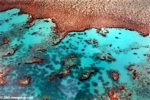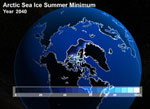FEATURED ARTICLES
Are Brazil nuts really sustainable?

|
|
(12/20/2006) A lot of rainforest conservation initiatives embrace sustainably harvested non-timber forest products (NTFPs) like seeds and nuts as a means to provide income to locals without harming the forest. Operating on the premise that such products are eco-friendly, hundreds of outfits ranging from Whole Foods to the Body Shop to Ben & Jerry's Homemade Ice Cream tout their use of sustainably harvested Brazil nuts and related products. But really, how sustainable are these products?
[
Rainforests | Sustainable Development]
"Europe's largest tropical rainforest" invaded by gold miners

|
|
(12/19/2006) As Europe frets over climate change and deforestation, threats to "Europe's largest tropical rainforest" are mounting, according to reports from French Guiana. While French Guiana is best known for its infamous Devil's Island penal colony and as the main launch site for the European Space Agency, which is responsible for more than 50% of the state's economy activity, most of the territory is covered with lowland tropical rainforest. As a department of France, French Guiana has the largest tropical rainforest under the jurisdiction and the responsibility of a European country. One might think that with this status, and Europe's concern with global warming, biodiversity preservation, and the environment, French Guiana's forests would be treasured and safeguarded. This is not the case. Over the past decade illegal mining has affected extensive areas especially in the region bordering Brazil and Suriname where wildcat miners known as garimpeiros are wreaking havoc as they search for gold. To date the French government has taken a lackadaisical approach to addressing deforestation and illegal land invasions.
[
Rainforests | Amazon]
An interview with rainforest plant expert Pierre-Michel Forget:
France needs to act to protect French Guiana's rainforests
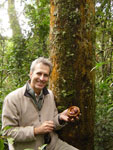
|
|
(12/19/2006) Understanding relationships between plants and animals is key to understanding rainforest ecology. Dr. Pierre-Michel Forget of the Muséum National d'Histoire Naturelle in France is a renowned expert on the interdependency between rainforest trees and seed dispersers. Author of dozens of papers on tropical forest ecology, Dr Forget is increasingly concerned about deforestation and biodiversity loss in forests of the Guiana Shield region of Northern South America. In particular he sees the invasion of informal gold miners (accompanying article), known as garimpeiros, as a significant threat to forests in French Guiana, Suriname, Guyana and Venezuela.
[
Interviews | Rainforests]
52 species discovered in Borneo rainforest

|
|
(12/18/2006) In 2006 scientists discovered 52 species in the highly threatened rainforests of Borneo according to a new report from WWF, an environmental group working to preserve the biodiverse "Heart of Borneo" from further destruction. The discoveries -- which include 30 fish species, two tree frog species, 16 ginger species, three tree species and one large-leafed plant species -- add to the ever growing roster of previously unknown species from the island. More than 400 previously unknown species has now been found on the island since 1994.
[
Borneo | Species Discovery]
Protecting Uganda's rare and precious primary forests:
President Museveni needs to do what's best for Uganda
(12/14/2006) In recent months Ugandan president Yoweri Museveni has moved to destroy some of Uganda's last remaining primary rainforests to give land to politically-connected plantation owners. Personally intervening in two disputes, one in Mabira Forest Reserve and the other on Bugala island in Lake Victoria, Museveni has argued that his country urgently needs such projects to industrialize and bring a better quality of life to Ugandans. He would be wrong. Sugar cane and oil palm plantations are not going to save Uganda. The country needs to focus less on agriculture, which is responsible for more than 80 percent of employment in Uganda but only 31 percent of its economy, and more on services, like tourism, which generate nearly half of its income despite employing only 13 percent of its workers. Uganda's remaining primary forests are rare, precious and irreplaceable -- it would be a shame to see them cleared for marginal sugar cane and oil palm fields.
[
Africa]
Obituary: the Baiji
(12/13/2006) After a short illness spurred by pollution, overfishing, boat traffic, and obstructions like dams, the Baiji was declared "functionally extinct" last night. As a species, the river dolphin found only in China's Yangtze River was 20 million years. Its demise was widely expected. The Baiji is survived by other river dolphins, all themselves threatened, in the Ganges, Indus, Amazon, Orinoco, and La Plata rivers. No memorial service will be held.
[
Extinction]
An interview with the largest sponsor of rainforest protection:
Who pays for Amazon rainforest conservation?

|
|
(12/11/2006) Last Monday, Brazil created the world's largest rainforest protected area in the northern Amazon. Covering more than 15 million hectares (57,915 square miles) -- or an area larger than England -- the network of seven new protected reserves has been met with praise by environmental groups. Instrumental in the development of the conservation project has been an organization that most people wouldn't associate with rainforest conservation but certainly should: the Gordon and Betty Moore Foundation.
[
Conservation | Amazon]
A better way to cut down the Amazon rainforest?
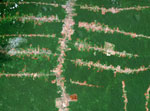
|
|
(12/11/2006) A new study suggests that deforestation that follows a "fishbone" pattern may be less damaging from an environmental standpoint than traditional clear-cutting. The reason? Fishbone deforestation patterns may create conditions that increase precipitation levels which help cleared vegetation recover quicker. The research, which will be presented this week by Somnath Baidya Roy, a professor of atmospheric sciences at University of Illinois at Urbana-Champaign, at the annual American Geophysical Union meeting in San Francisco, is based on analysis of deforestation in Rondonia, a state in Brazil where the "establishment of rural development projects has resulted in the construction of orthogonal road networks." Deforestation, which typically follows road and highway construction, has progressed in a fishbone pattern.
[
Deforestation | Amazon]
Interview with carbon finance analyst Johannes Ebeling:
Nairobi talks made progress on forest conservation for global warming emissions credits

|
|
(12/05/2006) Tropical deforestation is one of the largest sources of human-produced greenhouse gases yet it has no place in existing climate agreements. This has been a point of contention in negotiations as the United States has objected to some developing countries -- notably Brazil and Indonesia -- to be getting an apparent "free ride" on deforestation-related emissions in addition to emissions from fossil fuel sources. Recent negotiations have looked at this issue from a different perspective, one where developing countries would be paid by industrialized countries for reducing their deforestation rates. Globally the payoff could be immense, extending well beyond helping mitigate global warming emissions to safeguard biodiversity and important ecological services. While the media largely discounted the recent climate talks in Nairobi as a waste of time, progress was made on this important issue says Johannes Ebeling, a Masters of Environmental Science student at Oxford University who just completed an analysis of the potential of carbon finance to reduce emissions and preserve forests. In an interview with mongabay.com, Ebeling discusses his work and the outlook for carbon finance.
[
Interviews | Carbon Finance]
NEWS UPDATES
mongabay.com in Indonesian
(12/26/2006) The kids' rainforest information site is now available in Indonesian.
Madagascar plant may offer new treatment for malaria
(12/25/2006) A plant traditionally used by healers in Madagascar may offer a new way to treat malaria, a mosquito-borne illness that kills 2-3 million people -- mostly children in Sub-Saharan Africa -- per year.
[
Medicinal Plants]
Antarctic ozone depletion exceeds that of Arctic
(12/25/2006) A new study comparing ozone depletion between the poles shows that the Antarctic is experiencing the most severe depletion of the ozone layer. In the Antarctic, the researchers found that local ozone depletion at some altitudes often exceeded 90 percent and reached up to 99 percent during a typical Antarctic winter. Ozone depletion was lower in the Arctic, where losses only occasionally peaking at 70 percent.
[
Earth Science]
Warmer oceans reduce dispersal of shellfish larvae
(12/25/2006) In a study published in the Dec. 25 Early Edition of Proceedings of the National Academy of Sciences (PNAS), scientists show they can predict how the distance marine larvae travel varies with ocean temperature. The say that the findings have important implications for the conservation and management of fish, shellfish and other marine species in oceans increasingly effected by climate change.
[
Oceans]
Leaf-mimicking insects at least 47 million years old
(12/25/2006) With the discovery of a 47 million year old fossil of a lead insect, new research suggests that cryptic leaf-mimicking camoflauge is a time-tested strategy used by insects to avoid predators.
[
Animal Behavior]
mongabay in Malay and Russian
(12/23/2006) The rainforest site for kids is now available in Malay and Russian. Special thanks to Hoo Chiew Ping of the National University of Malaysia (UKM) for her help with the translation. Ping is writing her thesis on the role of institutions in deforestation in the Brazilian Amazon. The kids site is also available in Arabic, Farsi, French, Spanish, and Swahili.
Giant squid captured!
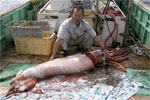
|
|
(12/22/2006) Japanese researchers captured a small female giant squid near the Ogasawara islands, 1,000 km (620 miles) south of Tokyo. The squid, which measured 3.5 meters (11 ft 6 in) long and weighed 50 kg (110 lb), was hooked at a depth of 650 meters (2,150 ft). The capture comes a year after researchers produced the first photographs and video of living squid.
[
Species Discovery]
Africa's rarest carnivore spotted in Tanzania

|
|
(12/21/2006) Africa's rarest carnivore, Jackson's mongoose, was spotted in the mountains of remote southern Tanzania by researchers with the Wildlife Conservation Society (WCS). Until now the species has been only known from a few observations and museum specimens.
[
Species Discovery | Africa]
Satellite imagery to be used to detect illegal logging, determine sustainability

|
|
(12/21/2006) A new project aims to use advanced satellite imagery to monitor illegal logging activities and help certify the sustainability of timber harvesting in some of the world's most remote forests. The effort could reduce the cost of forest management and certification, while helping to crack down on illicit tree-felling.
[
Logging]
Paraguay extends deforestation law that has cut forest loss by 85%
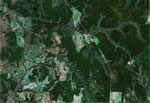
|
|
(12/20/2006) The government of Paraguay has extended a law has helped deforestation rates in the Upper Parana Atlantic Forest by more than 85 percent according to environmental group WWF. The "Zero Deforestation Law" -- which came into force in December 2004 -- has been extended through December 2008. The Upper Parana Atlantic Forest is part of the Atlantic Forest, a biologically rich ecosystem that has been reduced by 95 percent in some its of range due to agriculture, especially for soybeans and cattle ranching.
[
Environmental Law | Happy-Upbeat Environmental]
Borneo governor arrested in rainforest for palm oil fraud
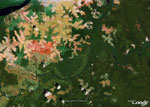
|
|
(12/20/2006) The governor of East Kalimantan on Indonesian part of the island of Borneo has been suspended and faces life in prison for his involvement in an oil palm plantation scheme that caused the deforestation of a million hectares of tropical rainforest. Suwarna Abdul Fatah has been charged with corruption, fraud, and abuse of power in connection with a multi-million dollar palm oil plantation in Berau district, along the Indonesia-Malaysia border, in an area near the "Heart of Borneo", a region characterized by rainforest and high levels of biological diversity.
[
Borneo | Indonesia]
Bush administration sued for failure to protect sea otter
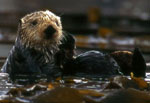
|
|
(12/19/2006) A conservation group filed a lawsuit Tuesday in federal district court in Washington, DC, seeking more protection for sea otters in Alaska. The Center for Biological Diversity, a national nonprofit conservation organization that aims to conserve endangered species and wild places, says that the Bush administration has failed to designate critical habitat for sea otters in southwest Alaska, despite the species' listing as Threatened under the Endangered Species Act in August 2005. Sea otter populations have decline by 90 percent in some areas according to the group.
[
Environmental Law | United States]
Worst coral reef die-off in 11,000 years; Marine protected areas boost fishing yields; Coral reefs help protect from tsunami damage
(12/18/2006) Four new studies involving coral reefs paint a mixed future for reefs while showcasing their importance to humans. Two studies by scientists at the Australian Research Council Centre of Excellence for Coral Reef Studies at James Cook University suggest that coral reefs may be in worse shape than previously thought. The first, appearing in the journal Geology indicates that the current large scale coral die-offs are now occurring more frequently than at any time in the last 11,000 years. The second, published in Current Biology, suggests that the loss of a single 'keystone' species can trigger a rapid shift in the health of a reef. Meanwhile a Princeton University study published in the December 14 edition of the journal Geophysical Review Letters indicates that healthy coral reefs can help reduce the impact of tsunami waves relative to unhealthy or dead reefs. Finally a study by Blue Ventures, a conservation group almost entirely funded by ecotourism in Madagascar, found that marine protected areas can benefit the fishing industry.
[
Coral reefs]
Does green investing pay as well as conventional investing?
(12/17/2006) Special to mongabay.com: Socially responsible investing is now a major Wall Street trend. But the real question is this: Can you make as much dough when you're being virtuous? In an article appearing in OnEarth, a publication from the Natural Resources Defense Council, writer Carol Vinzant examines financial returns from socially responsible investing.
[
Green Business]
mongabay.com launches in Arabic, Farsi, and Swahili
(12/16/2006) Arabic, Farsi, and Swahili language versions of the mongabay.com rainforest site for children are now available at world.mongabay.com. More languages will be online in early 2007.
Sea levels may rise higher than predicted due to global warming
(12/14/2006) Global warming could cause sea levels to rise by four-and-a-half feet (140 cm) according to new projections published in Friday's issue of the journal Science. Stefan Rahmstorf, a scientist at the Potsdam Institute for Climate Impact Research in Potsdam, Germany, uses air temperature measurements and past sea level changes rather than computer models to calculate that ocean levels could rise by 50-140 cm by 2100, well above the 9-88 cm projected by the United Nations Framework Convention on Climate Change. Rahmstorf says that historic data suggests that sea levels rise on the order of 10-30 meters per degree Celsius over the course of thousands of years. The U.N. has projected temperatures will rise by 1.4-5.8 C (2.5-10.4F) by 2100 due largely to human-induced emissions of greenhouse gases that result from fossil fuel combustion and deforestation.
[
Climate Change]
Looming desertification could spawn millions of environmental refugees

|
|
(12/14/2006) Africa may be able to feed just 25% of its population by 2025 if soil degradation on the continent continues at its current pace, according to a water expert presenting at an upcoming United Nations University (UNU) conference on desertification in Algiers, Algeria. Karl Harmsen, Director of UNU's Ghana-based Institute for Natural Resources in Africa, says that should soil conditions continue to decline in Africa, nearly 75% of the continent could come to rely on some sort of food aid by 2025.
[
Africa | Water]
2006 is third warmest year on record for the United States
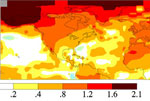
|
|
(12/14/2006) 2006 will likely go down as the third warmest year on record for the United States according to scientists at NOAA's National Climatic Data Center (NCDC) in Asheville, North Carolina. Globally, 2006 will have the sixth highest annual global temperature since record keeping began in 1880 NCDC says that the 2006 annual average temperature for the contiguous United States (based on preliminary data) will likely be 2°F (1.1°C) above the 20th century mean, making 2006 the third warmest year on record, just cooler than 1998 and 1934. 2006 has been a record year for wildfires which researchers say will continue to increase in frequency and intensity as climate continues to warm. NCDC notes that higher temperatures produced a net increase in energy demand with 9 percent lower winter use more than offset by a 13 percent increase in summer use for air conditioning.
[
Climate Change]
2006 is sixth warmest year, but hurricanes below average

|
|
(12/14/2006) 2006 will be the sixth-warmest year on record according to the World Meteorological Organization (WHO). The United Nations weather agency said the ten hottest years have all occurred in the past 12 years. 2005 was the warmest year since record keeping began 150 years ago, according to the agency. Preliminary figures show that 2006 was 0.42 degrees Celsius above the annual average from 1961-90. Final figures will be released in March 2007. Meanwhile hurricane and typhoon activity was below average with 61 tropical storms. The annual average is 63.
[
Climate Change]
Forests need good soil to sequester more carbon
(12/13/2006) Soil nutrition is key to helping forests absorb more carbon under elevated CO2 conditions according to new research by scientists with the USDA Forest Service and Duke University.
[
Forests]
Tigers can recover given protection, adequate food supplies

|
|
(12/13/2006) A new study says that if tigers are protected and have sufficient access to abundant prey, their populations can quickly stabilize. The findings have implications for conservation of the world's largest cat species which is fast-disappearing due to habitat loss and poaching for the animal parts trade.
[
Conservation]
African river basins storing less water,
putting agriculture, populations at risk
(12/13/2006) New satellite data from NASA show that the Mississippi and Colorado River basins are storing more water over the past five years, while the Congo, Zambezi and Nile basins are drying. While the findings are good news for U.S. agriculture, the research indicates that Africa continues to face geographic hardship.
[
Water]
Asian pollution fuels rain in Australia
(12/12/2006) A new study says that the haze produced by fires in southeast Asia causes increased rainfall in Australia by lowering regional ocean temperatures.
[
Haze]
Hotspot conservation will not protect global biodiversity
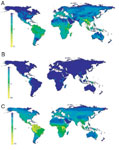
|
|
(12/11/2006) The concept of biological hotspots has served as a fundamental principle guiding conservation efforts over the past generation. A new study, published in the Dec. 15 online edition of the Proceedings of the National Academy of Sciences (PNAS), argues this may be a mistake and that conservation efforts based on hotspots will not effectively preserve biodiversity. "Instead," lead author Dr. Gerardo Ceballos told mongabay.com, "new protected areas should be selected because of their concentrations of endemic or endangered species, their complementarity, representation of local populations, and protection of ecosystem services."
[
Conservation | Biodiversity]
Unknown species of lizard discovered in Borneo
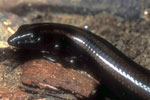
|
|
(12/11/2006) A previously unknown species of lizard was discovered in Borneo by Chris Austin, assistant curator of herpetology at Louisiana State University's Museum of Natural Science. The scientific name of the lizard, which was discovered while Austin was conducting field research in Sarawak, will be unveiled in the March 2007 edition of Journal of Herpetology. The discovery comes as Borneo's rainforests are increasingly endangered by logging, clearing for oil palm plantations for biofuel, and agricultural fires.
[
Conservation | Borneo]
Temperate forests do not help fight global warming
(12/11/2006) Trees planted in temperate zones could worsen global warming according to research that will be presented on December 15 at the American Geophysical Society annual meeting in San Francisco. The study, which shows that trees planted in tropical regions can help fight climate change, found that global forests actually produce a net warming of the planet.
[
Climate Change]
Melting glaciers, not ice sheets, primarily responsible for rising sea levels

|
|
(12/11/2006) A new study says that melting glaciers are contributing more to the global rise in sea levels than melting ice sheets in Greenland and Antarctica. Of the estimated 650 billion tons of ice lost to the oceans annually, some 400 billion tons comes from the melting of small glaciers and icecaps, according to Professor Tad Pfeffer of the Institute of Arctic and Alpine Research at the University of Colorado at Boulder. Only 250 billion tons -- or less than 40 percent -- comes from the melting of the Greenland and Antarctic ice sheets.
[
Greenland-Arctic | Climate Change]
President Museveni again moves against Uganda's forests
(12/11/2006) Ugandan president Yoweri Museveni has again taken action against rainforest conservation in Uganda, moving to hand a protected forest reserve over to private agricultural interests intent on clearing trees, according to a report from Reuters.
[
Africa]
Small insects tell us Earth is warming
(12/11/2006) Small insects known as midges are telling scientists that Earth is warming, according to research to be presented December 15 at the annual meeting of the American Geophysical Union in San Francisco.
[
Climate Change]
Global warming could save NASA millions in fuel costs
(12/11/2006) Carbon dioxide emissions produced from the burning of fossil fuels will produce a 3 percent reduction in the density of Earth's outermost atmosphere by 2017, according scientists from the National Center for Atmospheric Research (NCAR) and Pennsylvania State University (PSU).
[
Climate Change]
Ancient 'Loch Ness Monster' found in Antarctica
(12/11/2006) Paleontologists found a well-preserved fossil skeleton of a juvenile plesiosaur in Antarctica. Cryptozoologists say the plesiosaur resembles the legendary Loch Ness Monster, despite scientific evidence indicating that the marine reptile has been extinct for millions of years.
[
Paleontology]
Global warming could make Arctic sea ice-free by 2040
(12/11/2006) Global warming is causing an abrupt retreat in Arctic sea ice that could leave the Arctic Ocean with ice-free summers by 2040 according to research published in the December 12 issue of Geophysical Research Letters. A team of scientists from the National Center for Atmospheric Research (NCAR), the University of Washington, and McGill University used computer modeling to forecast the impact of greenhouse gas emissions on the Arctic. The models indicated that "the extent of sea ice each September could be reduced so abruptly that, within about 20 years, it may begin retreating four times faster than at any time in the observed record," according to a statement from NCAR.
[
Greenland-Arctic | Climate Change]
Nuclear war could cause global cooling (i.e. block global warming)
(12/11/2006) Nuclear war would disrupt global climate for at least a decade according to new research presented Dec. 11 at the annual meeting of American Geophysical Union in San Francisco. The research, based on findings from historic volcano eruptions, found that a small-scale, regional nuclear war could produce millions of tons of "soot" particles that could block solar radiation, in effect, cooling the planet. However the study stops well short of advocating nuclear war as a practical solution to global warming. The new study, also published on Atmospheric Chemistry and Physics Discussions, an online journal, projects fatalities of 2.6 million to 16.7 million per country in a small-scale, regional nuclear war.
[
Politics | Climate Change]
500 species found in census of marine life
(12/11/2006) Some 500 previously unknown species of marine life were discovered during the latest Census of Marine Life (CoML), a research effort involving some 2000 researchers from 80 countries. The discoveries, made during 19 ocean expeditions in 2006, included a gigantic 1-centimeter in diameter single-celled organism in the Nazare Canyon off Portugal, a "blonde-haired" lobster near Easter Island, a "chewing" squid, a "living fossil" shrimp in the South Pacific and a four-pound (1.8 kg) lobster off Madagascar. While the census found hundreds of previously unknown species -- including 150 species of fish -- the researchers behind the project also found evidence that marine biodiversity is in decline due to human influences.
[
Oceans | Biodiversity]
UN to report man's impact on climate less than thought
(12/10/2006) When it is released in February 2007, the UN Intergovernmental Panel on Climate Change (IPCC) will report that man's impact on global climate is less than previously believed according to a story published in the Sunday edition of the UK-based Telegraph.
[
Climate Change]
The Vaquita, the world's smallest cetacean, dives toward extinction
(12/10/2006) Fishing nets are pushing the world's smallest cetacean, the Vaquita (Phocoena sinus), towards extinction, according to a new study published in the current issue of Mammal Review, the official scientific periodical of the Mammal Society. Today around 400 Vaquita live in the northwestern corner of the Gulf of California, Mexico.
[
Oceans | Extinction]
Ebola kills thousands of gorillas in African park

|
|
(12/07/2006) The Ebola virus, a nasty hemorrhagic fever that causes massive organ failure and bleeding, is killing thousands of endangered gorillas across Central African forests according to new research published in the journal Science. While the findings suggests that even in strictly protected wildlife sanctuaries gorillas are not safe, the research provides insight on how to control Ebola outbreaks among wild gorillas (Gorilla gorilla) and chimpanzees (Pan troglodytes) if conservation groups are not scared off by big initial upfront costs. Dr. Peter Walsh, of the Max Planck Institute for Evolutionary Anthropology and a co-author of the paper, spoke with mongabay.com and said this is a one-time opportunity for ape conservation: "When people look back 100 years from now, most won't even remember Iraq. One thing they will remember is that we sat by and did nothing while our closest relatives slipped away. This is a case where one wealthy individual could have an enormous impact. He or she could quite literally save gorillas from ecological extinction."
[
Primates | Congo]
Prince Charles turns in private jet in effort to cut global warming emissions
(12/07/2006) Prince Charles will give up his private jet and fossil fuel-powered cars in exchange for commercial airlines and biodiesel cars in an effort to reduce his carbon footprint and help fight global warming emissions, according to a report from the Associated Press
[
Politics]
Bioprospecting links health and biodiversity conservation in Panama
(12/07/2006) The difference between bioprospecting and biopiracy as at times controversial, but a program run by the Smithsonian Tropical Research Institute (STRI) suggests that training professionals in high-biodiversity regions can help bring benefits to local populations while promoting biodiversity conservation. The program, called the International Cooperative Biodiversity Groups (ICBG), is profiled in the December issue of the journal BioScience.
[
Conservation]
Past global warming suggests massive temperature shift in our future

|
|
(12/07/2006) If past climate change is any indication, Earth could be in store for some significant global warming according to research published in the December 8, 2006, issue of the journal Science. The research, based on fossil records of terrestrial plants and oceanic plankton, suggests that the world's climate is highly sensitive to atmospheric carbon dioxide (CO2) levels, finding that a doubling of CO2 concentrations can raise global temperatures by at least 4 ∫F (2.2 ∫C). Current projections show that natural background atmospheric carbon dioxide levels are expected to double around mid-century due to fossil fuel combustion.
[
Climate Change]
Biomimicry of native prairie yields more bioenergy than corn ethanol

|
|
(12/07/2006) Diverse mixtures of plants that mimic the native prairie ecosystem are a better source of biofuels than corn grain ethanol or soybean biodiesel according to a new paper published in the Dec. 8 issue of the journal Science. Led by David Tilman, a biology professor at the University of Minnesota, the research shows that "mixtures of native perennial grasses and other flowering plants provide more usable energy per acre than corn grain ethanol or soybean biodiesel and are far better for the environment," according to a release from the University of Minnesota. The research found that highly diverse mixtures of prairie grasses and other flowering plants produces 238 percent more bioenergy on average than ethanol from corn grown on more fertile land.
[
Biofuels | Energy]
How to cut paper waste when printing web sites
(12/07/2006) A new service reduces paper waste when printing web sites according to a column by Walt Mossberg in today's Wall Street Journal. Mossberg highlights GreenPrint, software that analyzes documents before printing to minimize paper waste.
[
Green Business]
Global warming could reduce ocean productivity

|
|
(12/06/2006) Global warming could cause a rapid overall reduction in marine life resulting from diminished ocean productivity, according to a study published this week in the journal Nature. The researchers, led by Michael Behrenfeld of Oregon State University, say that the growth of phytoplankton -- the basis of the ocean food chain -- will likely be reduced by climate change. In turn, diminished phytoplankton populations would sequester less atmospheric carbon dioxide, triggering a positive feedback loop which would worsen climate change.
[
Poverty Alleviation | Technology]
Military technology used to catch poachers in Congo
(12/06/2006) Conservationists are using military technology to catch poachers in the act, according to an article published in the December 9, 2006 issue of New Scientist. The article says wildlife managers are using small seismic detectors developed by New York City-based Wildland Security, a firm that builds sensors for detecting wildlife crime.
[
Conservation]
Microsoft wants in on $100 laptop for poor children

|
|
(12/06/2006) Looks like Microsoft may want to be involved in the One Laptop Per Child project (OLPC) after all. Reports indicate that Microsoft wants to make its Windows CE operating system, one usually installed on handheld devices, available on the OLPC notebook computer, a $100 laptop designed for use by children in developing countries. Microsoft's apparent involvement in the project comes as a bit of a surprise following Bill Gates' derisive comments on the machine back in March when he called the machines underpowered and impractical.
[
Poverty Alleviation | Technology]
Brazil creates world's largest rainforest reserve
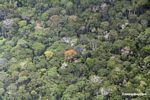
|
|
(12/05/2006) Brazil created the world's largest expanse of protected tropical rainforest in Para, the state where American nun Dorothy Stang was murdered after trying to protect land rights of rural poor. The network of seven new protected areas covers an expanse of 15 million hectares (57,915 square miles) -- or an area larger than England -- and links to existing reserves to form a vast conservation corridor in the northern Amazon, one of the most biodiverse regions on the planet.
[
Amazon | Brazil]
WSJ: oil palm plantations replacing Borneo's rainforest
(12/05/2006) The Wall Street Journal waded into the biofuels debate with an article on rainforest-clearing for oil palm plantations. The article, "Crude Awakening As Alternative Energy Heats Up, Environmental Concerns Grow" [subscribers only] by Patrick Barta and Jane Spencer discusses the environmental and health impacts of forest burning in Borneo. Related mongabay.com article: Why is oil palm replacing tropical rainforests?
[
Borneo | Biofuels]
California crop production could plunge due to global warming
(12/05/2006) Higher temperatures could cause a 40 percent drop in some of California's most popular crops by mid-century according to new research in the journal Agricultural and Forest Meteorology. Almonds, walnuts, oranges, avocados and table grape could be especially affected.
[
Agriculture]
Temperatures in European Alps at 1,300-year high
(12/05/2006) Temperatures in the European Alps are at the warmest point in 1,300 years according to the head of a European Union climate study.
[
Climate Change]
Green computing - Dell releases energy-saving server

|
|
(12/05/2006) Dell released a premium line of energy-efficient servers that consume considerably less power than regular models, joining a list of firms that offer consumers 'greener' products. Dell says that the new "Energy Smart" models cost about $100 more than comparably featured models and that customers can expect to save $200 per year in energy costs.
[
Green Design]
Moray eels and groupers hunt together
(12/05/2006) Moray eels and groupers hunt together according to research published in the December 5 issue of PLoS Biology. A team of researchers lead by Redouan Bshary, a biologist at the University of Neuchatel in Switzerland, found that moray eels and groupers practice cooperative hunting in Red Sea coral reefs -- behavior not before described outside primates and birds. The hunting habits of groupers, which are diurnal (day-active) predators that hunt in open water, are markedly different from moral eels, which are evasive nocturnal hunters that sneak through reef crevices in an attempt to ambush and corner prey. As such prey have distinctly different evasive behavior when confronted by groupers versus morays.
[
Animal Behavior]
Chinese river dolphin nearly extinct says official
(12/04/2006) Xinhua, China's state news agency, reported that a 26-day search for the Baiji, or the Yangtze dolphin, found no dolphins. The Baiji is highly threatened by pollution, overfishing, and obstructions like dams.
[
Extinction]
Logging roads lead to disease, social breakdown in Ecuador rainforest communities
(12/04/2006) Logging roads are linked to increased incidence of diarrheal disease and new social problems among communities along the Ecuadorian coast, according to a new study published in the Online Early Edition of Proceedings of the National Academy of Sciences. The results add to other studies that have correlated roads to disease transmission (malaria and HIV/AIDS), bushmeat consumption, and deforestation.
[
Logging]
Are old-growth forests storing more carbon than before?
(12/04/2006) Old-growth forests in China are storing more carbon than previously believed. The finding could have implications for fighting global warming through forest conservation, though some researchers caution that the results may not be representative of tropical forests as a whole.
[
Carbon Finance]
Great Barrier Reef shark populations collapsing finds study
(12/04/2006) Coral reef shark populations are declining rapidly due to fishing according to research published in the December 5th issue of the journal Current Biology. The paper says that "no-take zones" -- areas where fishing is prohibited -- can be effective in protecting sharks but only when the no-take regulations are strictly enforced. Examining two common species of sharks on the Great Barrier Reef in Australia, the researchers found that both populations are in the midst of a rapid population decline -- 7% per year for white tip sharks and 17% per year for gray reef sharks, showing that current shark conservation strategies are not effective.
[
Oceans]
Single strike killed the dinosaurs says new study
(12/01/2006) A new study argues that "one and only one" meteorite impact -- not multiple impacts as some scientists have suggested -- caused the extinction of dinosaurs some 65 million years ago.
[
Extinction]















